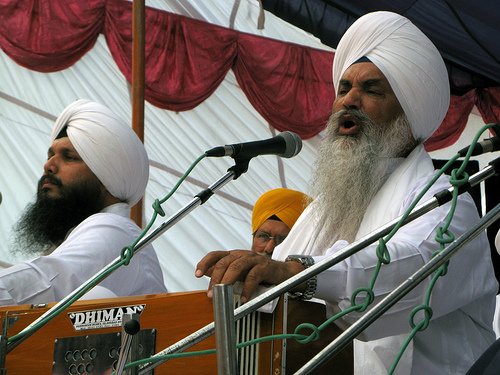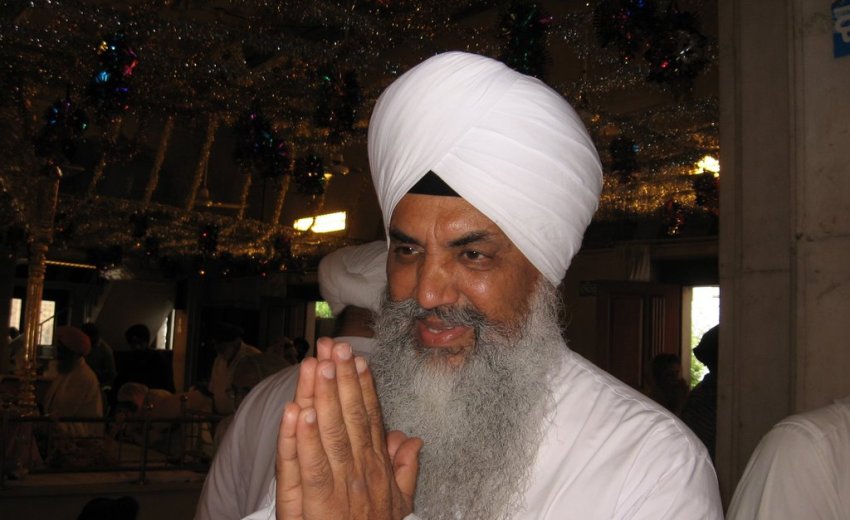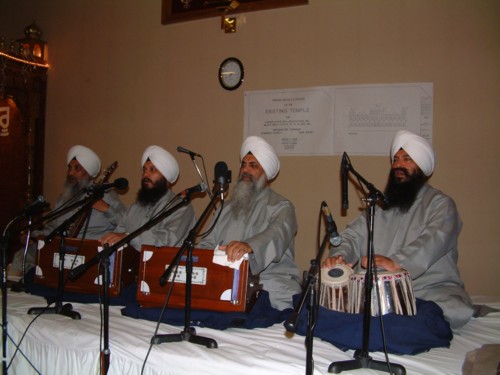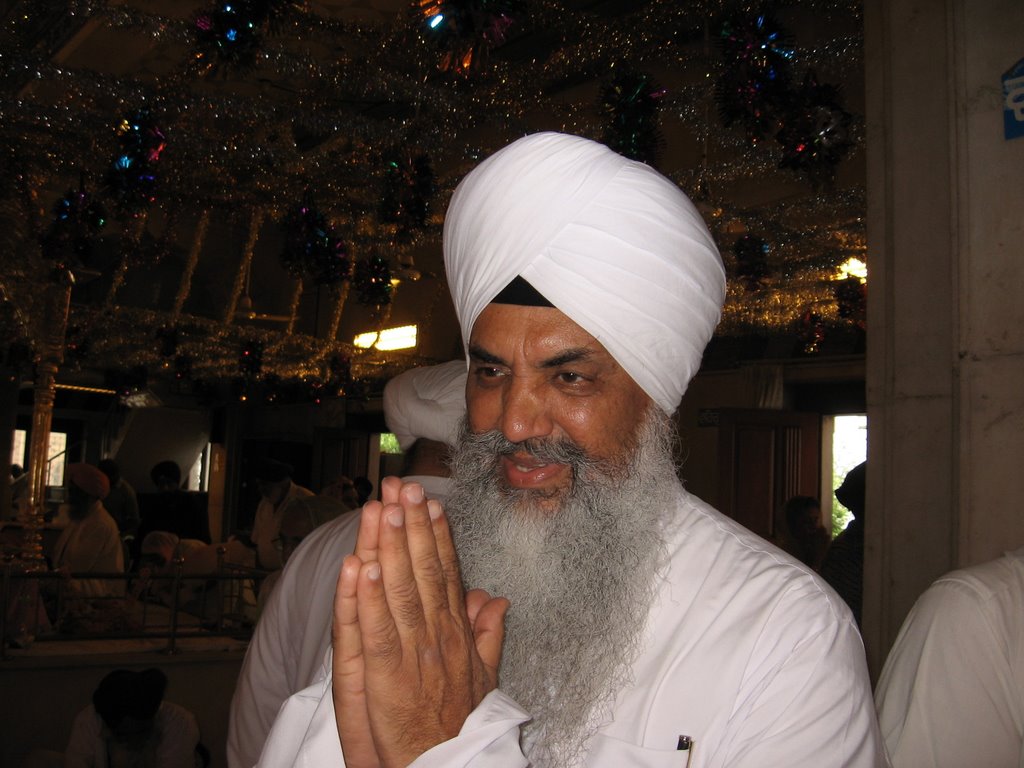
Bhai Amrik Singh Zakhmi with his son Bhai Harjot Singh
|
Bhai Amrik Singh 'Zakhmi' (Note : scroll down to hear his music)
Bhai Amrik Singh Zakhmi and his
Jatha at Bridgewater, New Jersey (2003) On November 10, 2013, the world of Gurmat Sangeet said farewell to one of its favorite sons. Bhai Amrik Singh Zakhmi, who had been ailing for some time and had suffered a stroke, passed away, leaving an aching void in the hearts of the many lovers of Gurmat Sangeet that he had touched over a long, illustrious career. Bhai Amrik Singh Zakhmi was the oldest son of Bhai Sahib Dharam Singh Zakhmi Ji, who was unequivocally one of the greatest Ragis of the 20th Century. Bhai Amrik Singh Zakhmi is survived by his son Bhai Harjot Singh Zakhmi, a fine kirtaniya in his own right, as well as two daughters. He is also survived by four brothers, Bhai Surjit Singh Zakhmi of Milwaukee, the redoubtable Bhai Hariqbal Singh Zakhmi of Bombay, Bhai Raghbir Singh Zakhmi of Seattle and Bhai Brat Pal Singh Zakhmi of Fresno. Bhai Amrik Singh Zakhmi and Bhai Hariqbal Singh Zakhmi were both part of the Jatha (ensemble) of Bhai Dharam Singh Zakhmi Ji, which also included their uncle, Bhai Sahib Shamsher Singh Zakhmi Ji, who was arguably one of the most brilliant Ragis that ever had the good fortune to serve the Panth. He was truly the voice of the Jatha and if you listen to the recordings of Bhai Saib Dharam Singh Zakhmi’s Jatha, it is his voice that you hear mostly during the Manglacharan (the introductory invocation to the first shabad) and the complex Alaaps (improvisational singing of notes that enhance the composition being sung) and Taans (rapid, syncopated improvisations). Bhai Dharam Singh Ji was the leader of the Jatha and the intellectual center weight. Bhai Hariqbal Singh’s primary role was to provide table accompaniment, but he was also blessed with a powerful and melodious voice, which he used to great effect, particularly during the Jatha’s recitation of the Asa Di Var. Bhai Amrik Singh Zakhmi’s role was subtler, yet no less critical. His were the hands that provided the elegant dilruba accompaniment that you hear in the recordings of the Jatha in its glory days. He also played an important role in reciting the Parmans; parts of shabads that served as commentary or explication for the main shabad being sung, as well as singing lovely Alaaps. Bhai Dharam Singh Ji became an Amritdhari in 1947. He spent years studying Gurbani and was an excellent and erudite speaker. In particular Bhai Sahib was very familiar with the Bani of the Dasam Granth as well as the Ghazals of Bhai Nand Lal. Often Bhai Sahib and his Jatha would sing Persian Ghazals by Bhai Nand Lal accompanied by the beautiful translations of Bhai Megh Raj Garib Ji. Bhai Dharam Singh Ji would intersperse his singing with very elegant and focused commentary; his command over Punjabi and Urdu was truly impressive and his presentation very cogent. Bhai Amrik Singh Zakhmi, clearly learned at the feet of his illustrious father. I have often heard echoes of the Great Bhai Dharam Singh Zakhmi Ji in Bhai Amrik Singh’s own commentary, after he formed his own Jatha. The Jatha of Bhai Sahib Dharam Singh Zakhmi Ji was absolutely unique in in its rendition of Gurbani. A key feature of their singing was the fact that their ucharan (enunciation) of Bani was always crystal clear. While the Jatha was very sophisticated musically and rigorously adhered to the rules of Raga and Tala, at no point did they ever let the Raga overpower the Shabad, which is the hallmark of a good exponent of Gurmat Sangeet. These elements were carefully preserved in the singing of Bhai Amrik Singh Zakhmi and his Jatha as well. Bhai Dharam Singh Zakhmi belonged to the village of Manko in District Jalandhar. The village is close to Shamchaurasi, home to the famous Pakistani Khayal singers Salamat Ali Khan and Nazakat Ali Khan. Bhai Sahib was often eferred to as 'Shamchaurasiwale' or belonging to Shamchaurasi. Even though he had received the gift of music from his forefathers, Bhai Sahib studied Gurmat Sangeet under the guidance of Prof. Darshan Singh Komal, another giant in the world of Gurmat Sangeet. After the passing of Bhai Dharam Singh Zakhmi Ji and Bhai Shamsher Singh Zakhmi Ji, the mantle clearly passed to Bhai Amrik Singh Zakhmi, who kept the family tradition alive by singing the old compositions that had been transmitted through the masters, traveling to Gurdwaras and Sangats (congregations) all over the world. Unfortunately I did not get to know Bhai Amrik Singh Zakhmi very well. I had already moved to Boston, when he visited the Bridgewater, NJ Gurdwara Sahib in 2003. Our conversations had always been on the phone. I remember the first one rather vividly. It was probably 2005. I had started the Gurmat Sangeet Project a year earlier and one of the first set of recordings that were made available on the website www.gurmatsangeetproject.com was an extensive archive of recordings of Bhai Sahib Dharam Singh Zakhmi Ji and his Jatha, made in Singapore, several years ago, which were absolutely the most precious set of Gurmat Sangeet recordings that I had been able to find at that time. I had enjoyed these recordings for several years, and the desire to share them with Sangat members the world over, was a major driving force in the creation for the Gurmat Sangeet Project. One evening I got an unexpected phone call. The voice on the other end was warm, pleasant and very cultured. It was Bhai Amrik Singh Zakhmi. These were early days, as far as hosting Gurmat Sangeet recordings on the internet was concerned. Bhai Amrik Singh Zakhmi had found the archive and the small write-up about Bhai Sahib Dharam Singh Zakhmi Ji and his Jatha and was clearly delighted. He proceeded to thank me for the great respect shown to his father and uncle and then somewhat unexpectedly, asked me to make a small correction in the write-up. My article, drawing upon various sources had mentioned the Rababi roots of Bhai Dharam Singh Zakhmi Ji and his family, something that Bhai Amrik Singh Zakhmi wanted me to ‘correct’, as in his words, nobody in his family had ‘ever played the Rabab’. It only took me a nanosecond to understand the real nature of his objection and for a moment, I reflected on the sad state of our Panth today. We the inheritors of perhaps the most egalitarian tradition on earth, which is founded on the bedrock of equality, have still not been able to shake off the cultural and social baggage of caste and origin that we have carried for time immemorial. To me, an association with the House of Bhai Mardana is a singular honor, but then who am I to judge anyone! Particularly an erudite an accomplished Kirtaniya of the Guru, who had rubbed shoulders with giants and had dedicated his whole life to serving the Panth by preserving this, the most valuable of all the treasures that the Gurus have bequeathed upon us! The article was duly edited! Over the years, I made it a point to call Bhai Sahib during my frequent trips to India. I would inquire after his health, which had been a bit fragile. We would make plans to meet; to invite him back to the US, which alas, were never to come to fruition. In the end, I never met Bhai Amrik Singh Zakhmi in person. Yet I feel I know him. Well. Through his melodious voice. His polished commentary. His soulful Dilruba playing. Most of all through the great treasure that he has left for posterity. May the Zakhmis keep singing for many more generations!
~ Sarbpreet Singh Nov 12, 2013 -> You can listen to Bhai Amrik Singh Ji's music in the Gurbani Media Center here.
|


